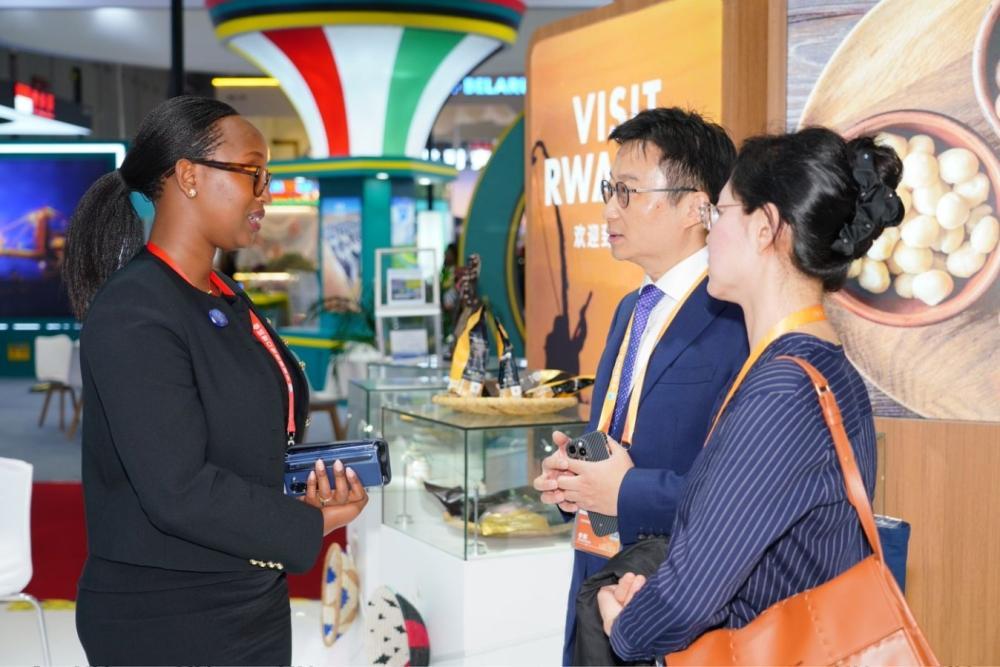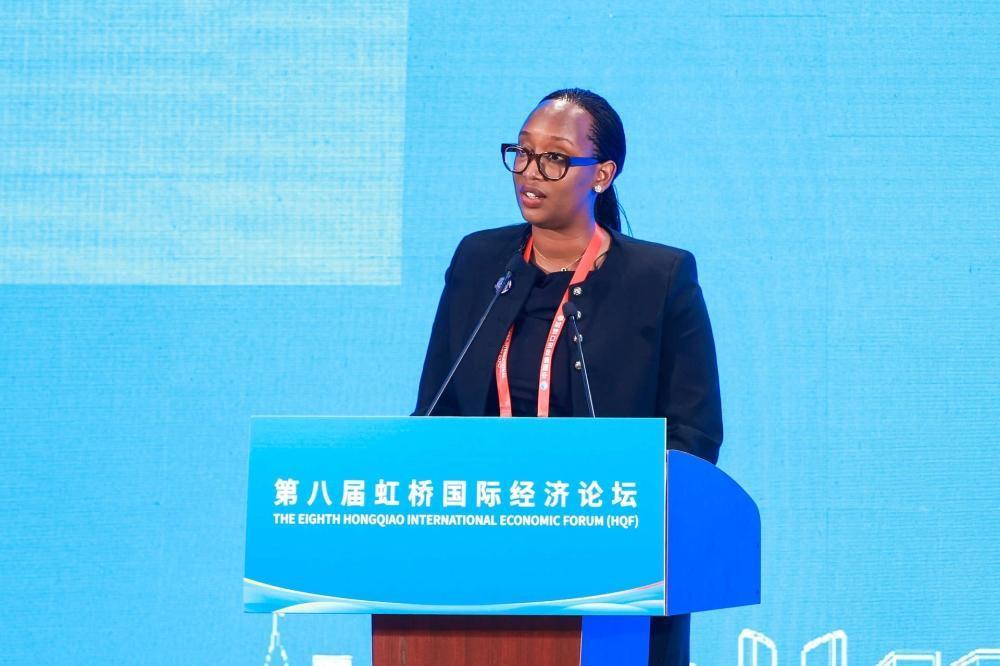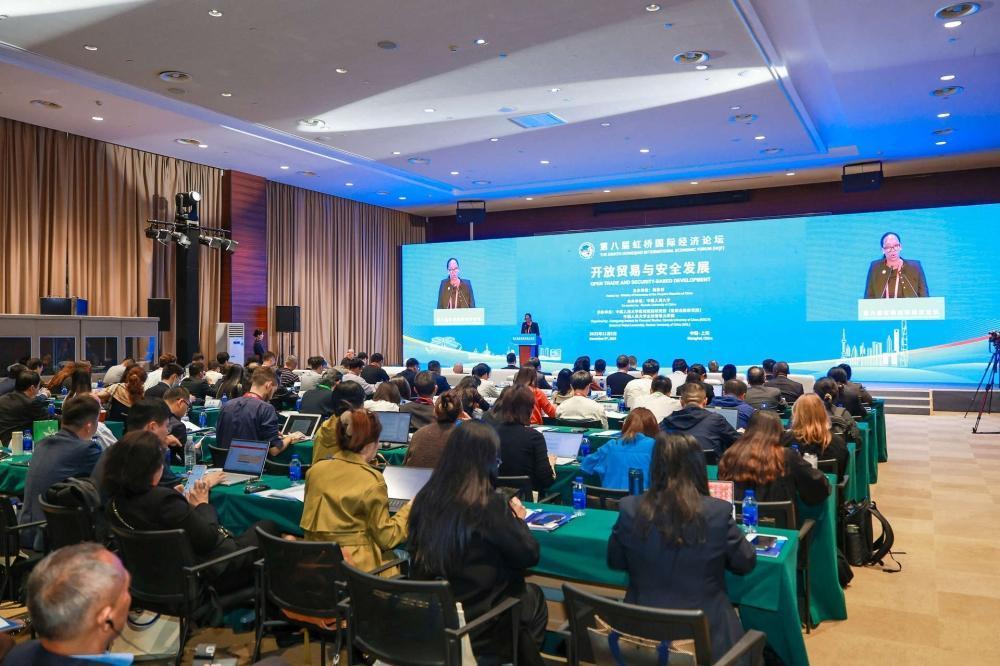Africa-Press – Rwanda. Rwanda Development Board (RDB) Chief Investment Officer Michelle Umurungi has expressed optimism that Rwanda can gain a stronger foothold in the Chinese market as Rwandan companies showcase their products at the 8th China International Import Expo (CIIE).
The event, which runs from November 5-10 in Shanghai, China, has set new records in both exhibition area and exhibitor numbers, bringing together over 4,000 exhibitors from 155 countries and regions.
During her remarks at a session on Open Trade and Security-based Development, Umurungi highlighted the importance of open and rules-based trade in fostering sustainable and inclusive growth.
African participation at this year’s CIIE has grown significantly, with 17 countries represented in the Country Exhibition and an 80 percent year-on-year increase in the number of participating businesses.
As Africa’s largest trading partner for 16 consecutive years, China continues to expand market access for African products and services, strengthening economic and trade cooperation across the continent.
The event, held in Shanghai, has set new records in exhibition area and exhibitor participation, bringing together over 4,000 exhibitors from 155 countries and regions.
How is the CIIE helping to create new pathways for Africa’s growth, innovation, and shared development with China? Michelle Umurungi, Chief Investment Officer at RDB, Maria Immanuel, Senior Trade Advisor at the Namibian Agronomic Board, and Kupakwaishe Midzi, Client Advisor in the Export Development Department of ZimTrade, shared their insights with China Africa Talk.
China Africa Talk: Could you give us an overview of the African pavilions at CIIE 2025, including product genre and notable participating companies?
Kupakwaishe Midzi: Based on what I’ve seen, the pavilions representing African countries actually present a vibrant showcase. They represent Africa’s creativity, resourcefulness, and innovation. Their displays include a wide variety of products, from agricultural produce to premium beverages and wines, essential oils, and processed foods. They also have investment portfolios in other sectors.
Zimbabwe has 15 companies exhibiting under the Zimbabwe pavilion. However, we also have an equal number of companies that could not get space to exhibit. We also have about 15 non-exhibiting companies that decided to come to CIIE to explore opportunities for those exhibiting under the Zimbabwe pavilion.
We are proud to exhibit some of our premium multicultural products, including our rich, natural teas, leather products, and fine crafts, which reflect our country’s growing export diversification portfolio.
Michelle Umurungi: The energy here at CIE is vibrant. There are a couple of pavilions hailing from African countries. For Rwanda, in particular, we have a dozen companies here. Hopefully, we will gain a foothold in the Chinese market. Some of the products include coffee, tea, and honey. You can see that Chinese consumers like the taste of these products. We’re hoping to increase our trade with China.
Maria Immanuel: Overall, this is an opportunity for Africa to deepen mutual understanding and achieve win-win cooperation with China. The country pavilion provides African countries with an important platform to showcase their overall image and explore trade and investment opportunities, especially in Namibia. Micro, small, and medium enterprises (MSMEs) are taking center stage. This allows them to showcase their products and network. Of course, it also gives them the opportunity to access one of the world’s largest markets, the Chinese market.
China Africa Talk: How are the general trade relations between your country and China? Any latest developments?
Maria Immanuel: Yes, definitely. Trade relations between Namibia and China have grown over the years. China is one of Namibia’s largest trading partners. In 2024, Namibia recorded a trade surplus with China. Also, in terms of expansion, a trade operations agreement was established with China in 2018, and we sent a shipment of beef to China in 2019. As a result, Namibia secured a beef market and expanded trade relations in the agricultural sector. Last year, we exported about 600 tons of beef to China. We also export fishery products, mainly lobsters.
Currently, we are finalizing trade agreements on table grapes, citrus, and blueberries. If you consider high-value horticultural products and fisheries products from Namibia.
China Africa Talk: What’s significance of CIIE to Zimbabwe? Following the signing of a blueberry export protocol during President Emmerson Mnangagwa’s visit to China in September, are we likely to have blueberries from Zimbabwe at the expo?
Kupakwaishe Midzi: Believe me there’s nothing I would have wanted more than to see our Zimbabwean blueberries at this expo. However, since the protocol was signed in September, there are still some housekeeping issues that we are diligently working on with both Zimbabwe and China to ensure that, by the next CIIE, we will start to see some Zimbabwean blueberries.
This showcase is a significant event for us in Zimbabwe because it gives us an opportunity to raise our profile as a reliable exporter. It also gives us an opportunity to attract Chinese investment and deepen our trade linkages with China, which has been our longstanding partner for many years.
China Africa Talk: A special section for the least-developed countries products was launched alongside an upgraded Africa products section, helping African businesses leverage zero-tariff treatment to enter the Chinese market. What impact has this had on the presence of companies from your country participating this time around?
Maria Immanuel: This zero tariff treatment for African products is a game changer, not only for Africa, but also for global trade. If you look at the current global trade shift, you’ll see that this is a real game changer for Africa. Africa has just started implementing the African Continental Free Trade Agreement (AfCFTA), which aims to increase intra-African trade. However, I think it’s also important for Africa to align the AfCFTA not only within Africa but also with global markets, such as the Chinese market. This would stimulate the participation of MSMEs in global trade. The impact of trade is really at the level of competitiveness and access to the cheap inputs required to add value to African products in order for them to enter the Chinese market. Overall, an opportunity like this is supposed to stimulate manufacturing in African nations as they try to create value-added products, as well as expand beyond Africa by trading services and goods.
Most importantly, I think we should look at the Chinese market, which is one of the biggest markets in the world and offers duty-free access, unlike other markets that charge duties. This gives businesses in Africa immediate competitive advantages. This is a significant opportunity for African countries to attract investment, leverage innovation, and increase MSMEs’ participation in global trade.
Kupakwaishe Midzi: The introduction of the zero tariff policy is a very welcome initiative for Zimbabwean exporters because it helps lower barriers and enhances our ability to showcase goods competitively. For example, according to Chinese reports, this preferential treatment opens significant doors for African producers. From Zimbabwe’s perspective, we have seen increased interest from companies to engage with China given this special section and preferential treatment. As Zimbabwe, we see China’s dedication and commitment as an opportunity to further enhance our companies’ readiness. As for trade, we are working diligently to boost Zimbabwean businesses and their export readiness. As you know, China is a huge market with high quality standards. As ZimTrade, we support Zimbabwean businesses to ensure they meet these quality packaging standards. We’re using the CIIE platform to explore networking opportunities with buyers and distributors, as well as potential partners who can enhance the quality and packaging of products for this market.
Michelle Umurungi: I believe that China’s zero tariff policy for African countries will increase the competitiveness of our products in the market. It certainly reduces the costs that our exporters have to incur. We believe it will continue the upward trend we’re seeing. Through this policy, Chinese corporations have extended trust and openness to their markets. I think this reflects the theme of this 8th edition as well: “New Era, Shared Future”, shared prosperity in an era where China and the continent continue to prosper together.
China Africa Talk: What new opportunities does your region present to China and vice versa?
Kupakwaishe Midzi: Between Zimbabwe and China, it offers a particularly compelling example. Looking at it from China’s perspective, Zimbabwe offers a vast and growing market rich in natural resources, which aligns with the theme of this year’s CIIE. You can think of agricultural resources and minerals, as well as increasing potential for value-added processing and enhancing the local supply chain.
For example, Zimbabwe is already making headway in the global horticultural market with products such as the blueberries you mentioned earlier, which are among the most in-demand super foods. Zimbabwean blueberries are among the most in-demand blueberries in the world. Our exports currently total about 57 million dollars. This may seem relatively small compared to the Chinese market, but our exports have grown at a compound annual growth rate of around 38% over the past five years. This is how we market ourselves: Zimbabwe is the place to be if you’re looking for opportunities in the blueberry industry. China remains an important destination market, technology partner, and investor. According to the Zimbabwe Investment and Development Agency, Chinese firms accounted for over 60% of all foreign investment approvals in 2024. China is the largest investor in Zimbabwe, and from a trade perspective, it is our third-largest trading partner.
Maria Immanuel: Africa is a place that we all know about. Even now, with the African Continental Free Trade Area (AfCFTA), when we talk about trading with each other, we’re still talking about raw materials, such as minerals and agricultural products. We need to upscale beyond that. Africa now needs to prioritize adding value so that we can also trade value-added goods in the global market. This requires innovation, technology, and investment. All of these are opportunities for exchange between Africa and China. We should not forget our competitive advantages, especially in the tourism sector. Tourism has also emerged as a significant opportunity between Africa and China. It’s one of those things we need to leverage. This is really cutting into trading services. Most of the time, we often talk about trading goods. We want to manufacture because manufacturing provides jobs and increases income for small businesses. However, I think we also have a huge opportunity in trading services. The world is already focused on trading services, and I think Africa should not only focus on trading goods. We should be able to trade goods and services and balance trade in general.
For More News And Analysis About Rwanda Follow Africa-Press








